12 Best Etsy Alternatives For 2024 (Comparison)

Looking for some good Etsy alternatives to sell your products on? You’re in the right place.
Etsy is a great option for businesses, particularly if you’re looking to sell unique or handmade goods that can’t be found easily on other online marketplaces—but it isn’t perfect.
In recent years, Etsy has become saturated with dropshippers, print-on-demand sellers, and even some high-street merchants—so it’s getting harder to compete and make sales.
So, whether you’re looking for a more niche platform, or you want to save some money on transaction fees, we have a ton of great Etsy alternatives for you to try.
In this article, you’ll find a comparison of the best online marketplaces, store builders, and ecommerce platforms that you can use instead.
TL;DR:
There are a couple of downsides to Etsy. You have to share your profits, there’s very little control over how you can sell products, and the platform is rife with competition.
If these are issues for you, the best alternative is to sell products in your own store. Sellfy provides one of the easiest ways to build your own store without taking a slice of your profits.
The platform allows you to sell physical products, digital products, subscriptions, print-on-demand merch, and more.
However, if you’re looking for a more direct alternative to Etsy, I’d highly recommend checking out GoImagine. This platform has many of the same features as Etsy, but it offers more affordable transaction fees and is less saturated with dropshipping items.
The platform also donates all transaction fees to children’s charities in the US making it a great option for creators looking for a more socially conscious alternative to Etsy.
#1 – Sellfy
If you’re looking to move away from a seller’s marketplace and create your own store, Sellfy does a great job of bridging that gap.
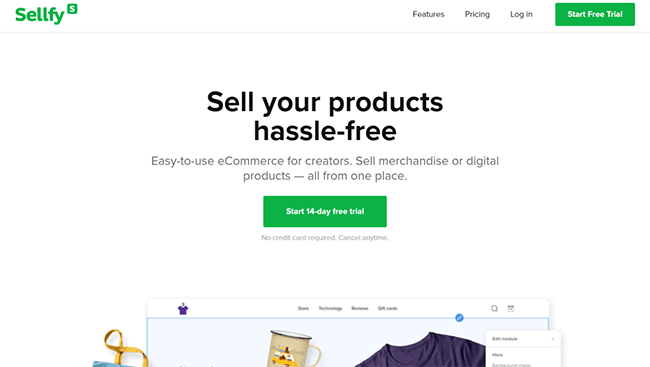
It’s a beginner-friendly tool that will allow you to create your own online store in just a few simple steps. You can start first by creating listings for your own products. You have a choice of listing physical products, digital products, and even print-on-demand products which gives you great versatility as a seller.
Once you’ve created your products, you can then use the Sellfy store tools to customize the look and feel of your store in just a few clicks. Once you’re happy with your store and product listings, you can go ahead and connect a payment gateway.
Sellfy supports payments using Stripe or PayPal making it easy to securely collect payments from your customers.
What’s great about selling with Sellfy is that you can pay one single monthly fee, and enjoy 0% transaction fees, making it the perfect alternative for sellers looking to move away from Etsy’s costly and complicated fee model.
Sellfy also includes some additional features such as email marketing and product up-selling features that can help you maximize sales.
Key features
- Store creation tools
- Sell physical, digital, and POD products
- Stripe and Paypal payment gateways
- Email marketing
- Cart abandonment
- Product up-selling
Pros
- 0% transaction fees. Only pay 1 monthly subscription fee
- Easy-to-use
- Diverse range of product options
Cons
- Not a marketplace which affects discoverability
- Limited print-on-demand products
Read our Sellfy review.
#2 – GoImagine
GoImagine is a US-only online marketplace and one of the best like-for-like alternatives to Etsy. The marketplace has a similar look, and functionality to Etsy, but it’s more true to the handmade and handcrafted ethos than Etsy is these days.
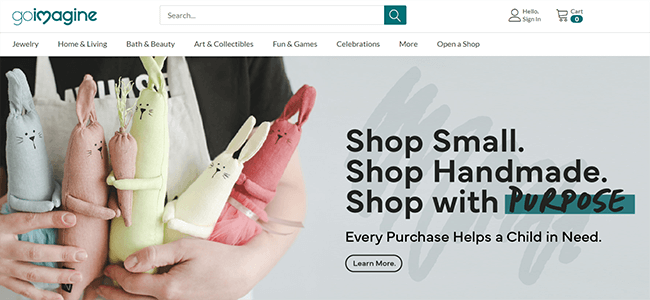
GoImagine has strict guidelines that products must be made by independent sellers or small businesses, using hand tools and light machinery. That means no saturation from digital products, POD, and drop-shipped items.
When it comes to fees, GoImagine is also a little more ‘homegrown’ than Etsy. Although the platform does still charge 5% transaction fees as well as monthly fees, all transaction fees are donated to charities that support young people and children, such as Horizons for Homeless Children and Relief Nursery.
Monthly plans for the platform are quite affordable, starting from $2.50 a month for up to 25 product listings. You can also upgrade your plan to sell more products and enjoy lower transaction fees, All-Star plan users can also create a standalone store.
Key features
- Handcrafted product marketplace
- Seller dashboard
- Handmade and handcrafted products only
- Options to create standalone store
- Maximum 5% transaction fees
Pros
- No oversaturation from dropshippers or POD sellers
- Socially conscious company that donates transaction fees
- Affordable pricing plans and lower transaction fees than Etsy
Cons
- Not as well known as some other platform
- Product guidelines are strict
- Only available to US sellers
#3 – Amazon Handmade
Although Amazon is usually associated with affordable mass-produced goods from around the world, the company has also extended its tendrils into the handmade goods market.
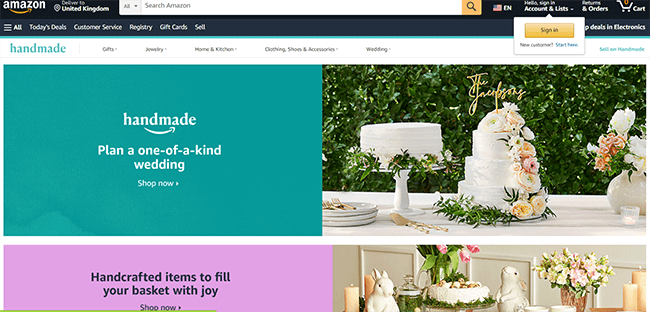
Amazon Handmade is an offshoot of the original Amazon marketplace and can be used to sell more unique items like gifts, personalized products, jewelry, home decor, and more.
Amazon Handmade is a good Etsy alternative in some ways, as sellers can take advantage of perks like shipping using FBA(fulfilled by Amazon), no listing expiration, and more.
You can also take advantage of amazon sponsored ads to increase your brand’s discoverability, and make the most of Amazon’s large worldwide audience to boost sales.
However, as is often the case with Amazon, fees on this platform are incredibly high in comparison to other options. The company takes a 15% commission from each transaction, and there is a monthly membership fee too.
If you’re in need of a boost in sales and exposure, then Amazon Handmade may be the right Etsy alternative for you, but be sure to check out the fees and shipping options to make sure that they work for your business.
Key features
- Handmade product marketplace
- Shipping using FBA
- Analytics
- Amazon sponsored ad
- No listing expirations
Pros
- Easy-to-use and intuitive interface
- Amazon has a good customer base that can be tapped into
- Fulfilled by Amazon can help improve your shipping processes
Cons
- Fees are high
- Sales on Amazon Handmade are less personal, and customer relationships are heavily controlled
#4 – Bonanza
Bonanza is an online shopping marketplace that claims to be the home of ‘everything but ordinary’ products. The site plays host to unique wares from around the world and offers a more affordable alternative to Etsy.
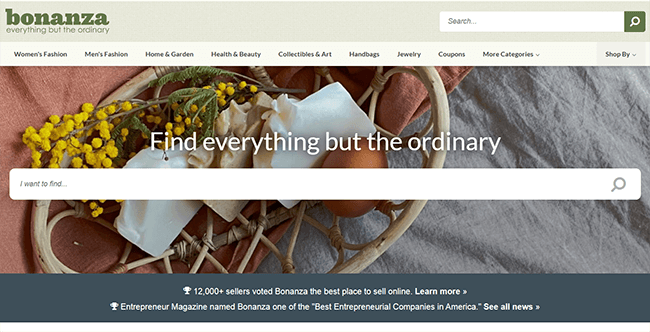
Although Etsy and Bonanza are quite similar, Bonanza also shares some similarities with Ebay. On Bonanza, negotiating prices and bidding for items is commonplace, so it’s a good idea to increase the prices of your products a little to allow for some room to negotiate.
What’s great about Bonanza is that listing your products is free and listings don’t expire as they do on Etsy. This makes it easier and cheaper to list a wide array of products for sale. Bonanza only charge a fee once your product is sold, with transaction fees starting at just 3.5%, which is almost half of what Etsy charges.
You also have the option of creating a standalone online store using Bonanza which is a good option if you’re looking to scale up your business.
In addition to this, you can also create automated listings on other sites such as Google Shopping and eBay and take advantage of a range of marketing and analytics tools
If you want to get started selling on Bonanza and you have a pre-existing Etsy store, you can easily import your product listing to speed up the process. You can also import listings from Amazon, eBay, and Shopify.
Key features
- Online marketplace for unique and handmade goods
- Marketing and analytics tools
- Automated listings on other platforms
- No listing fees
- No listing expiration
- Import listing from other sites
Pros
- Easy-to-use
- Low fees in comparison to Etsy and other options
- Easy to switch from Etsy, Amazon, Shopify and more
Cons
- Not as large customer base as Etsy
- Negotiable pricing model is not for everyone
#5 – Storenvy
Storenvy is an online marketplace that claims to be the world’s most socially driven marketplace. It’s the home of all things indie and a great place to sell unique or handmade goods.
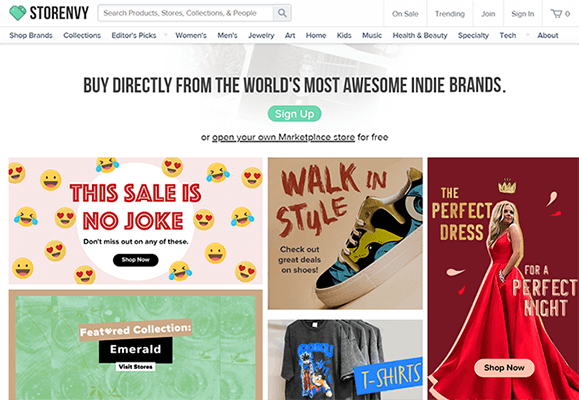
With Storenvy, you can build a free online store, and list your products on the Storenvy marketplace. This means you get the best of both worlds, and you can make sales outside of the platform as well as from the marketplace.
Although it’s not as popular as Etsy, Storenvy has an established user base of people that are really into indie products, so if you think that your products are particularly unique and interesting, then it could be the perfect platform for you.
By far the biggest drawback of Storenvy is the fee. Although they offer a free hosted store, you will pay a large commission on your marketplace sales. Commission fees start at 15% and increase if you choose other options such as Managed Marketing.
Despite the high commissions though, Storenvy is still a solid option for indie creators
Key features
- Free hosted online store
- Product Marketplace
- Marketing options
- No listing fees
Pros
- Free online store included
- Marketplace has engaged customer base
- Good for unique indie products
Cons
- Very high commission fees
- User base is a lot smaller than Etsy
#6 – Folksy
Folksy is a UK-based craft marketplace that markets itself as the UK’s biggest online craft fair. The ethos of Folksy is more true to the original Etsy, with all products being handmade or created by genuine craftspeople.
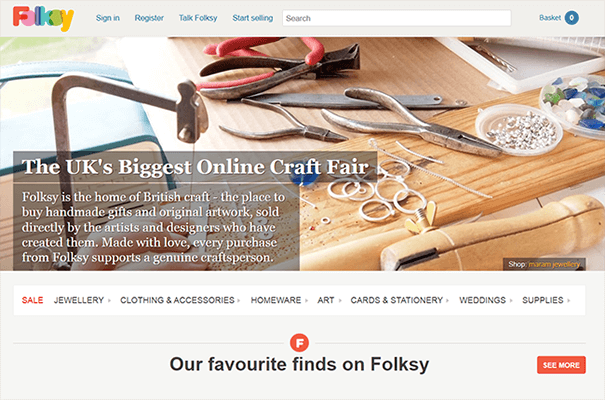
The Folksy site looks a little pared back, but it has everything you need to make sales online. You can create a storefront and list your products, check out your shop analytics, and get access to fast and friendly support. There’s even an app that you can use to list and manage your products.
Folksy is very similar to Etsy in terms of fees and all prices are listed in GBP. To get started you’ll need a subscription. Folksy subscriptions start from £6.25 per month, and sales will be subject to 6%+VAT commission. Alternatively, you can list individual items for 18p per item.
Key features
- Storefront builder
- Shop analytics
- Mobile app
- Good support options
- Subscription or pay per item pricing model
Pros
- Flexible pricing models
- Mobile app is useful
- True handmade, handcrafted marketplace
Cons
- Commission fees are quite high
- Subscription required
#7 – Shopify
Shopify is the most popular fully-hosted ecommerce solution on the market. It’s a flexible, powerful way for sellers that are ready to leave Etsy to sell their products through their own website.
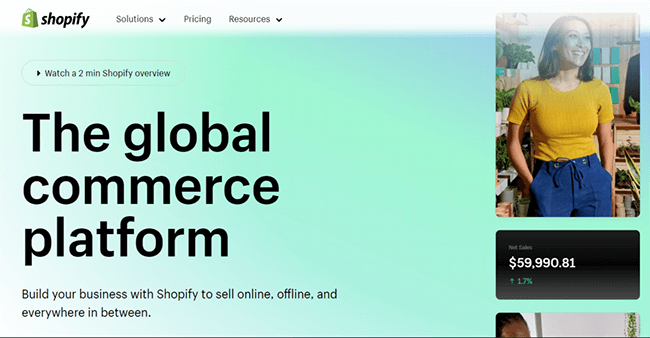
More merchants use Shopify to build their sites and power their ecommerce businesses than any other hosted platform, and there’s a reason for that.
Not only does it offer one of the best, fastest checkouts on the market, but it’s also packed full of tools and features to help you sell more products and scale up your business. That includes email marketing tools, analytics, order management, product management, forms, paid ads, automated workflows, a chatbot, etc.
And if there’s something you want that Shopify doesn’t offer out of the box, the chances are that you’ll be able to find a third-party add-on that can handle it in the Shopify App Store.
There are literally thousands of plugins available that can extend your store’s functionality in all sorts of ways, like add-one for selling print-on-demand Merch, A/B testing, drop shipping, etc. This extensibility is one of the things that makes Shopify so powerful.
Shopify is also fairly easy to use. You can sign up and build a basic storefront in minutes, and uploading products to your catalog is a cinch.
Plans start from $5/month and additional transaction fees may apply.
Key features
- Store Builder
- Custom domain
- Unlimited products
- App Marketplace
- Marketing tools
- Inventory management
- Discount codes
- SSL certificate
- Abandoned cart recovery
- Reports
- Shopify Payments
Pros
- Huge app marketplace (highly extensible)
- Easy to use
- High-converting checkout
- Flexible design options
Cons
- Higher starting price than other ecommerce platforms
- Additional transaction fees if you don’t use Shopify payments
Read our Shopify review.
#8 – Squarespace
Squarespace is best known as a general-purpose website builder, but it also has decent ecommerce functionality. You can use it to create your own online store and use it to sell products instead of Etsy.
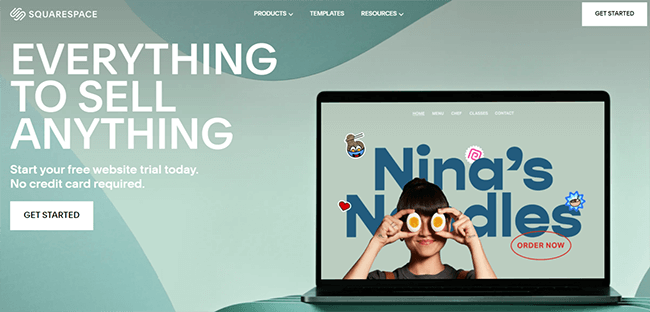
Squarespace offers most of the same features as the other site builders we’ve looked at: drag-and-drop design tools, inventory management tools, marketing features, flexible pricing, shipping options, etc.
What makes it special is how beginner-friendly it is. It’s very easy to use, and even offers the ability to import your Etsy product catalog in a few clicks. This makes the process of migrating over from Etsy to an online store much easier.
It also comes with a bunch of other useful tools for new sellers, like a video maker, SEO tools, creator tools, logo maker, appointment scheduler, etc.
It’s also very affordable. Regular plans start at just $16/month, but we’d recommend one of the Commerce plans, which starts from $27/month, as they have 0% transaction fees.
Key features
- Drag and drop design tools
- Templates
- Free custom domain
- Website analytics
- Ecommerce features
- Branding tools
- Inventory management
- Checkout
Pros
- 0% transaction fees on the commerce plan
- Beginner friendly
- Easy to import your Etsy store
- Lots of useful tools for new sellers
- Affordable
Cons
- Lacks some advanced features
- Not as flexible/customizable as some other platforms
#9 – Big Cartel
Big Cartel is an ecommerce platform geared towards artists, creators and craftspeople.
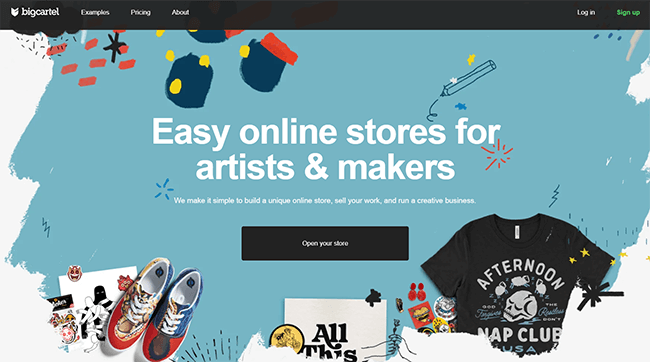
You can set up your own online store for free and list up to 5 products in your store for free too. If you want to list more than 5 products you can upgrade to a paid plan that starts at $9.99 per month.
The paid plans give you a bunch more features that can also help with your marketing strategy such as discounts and promo features, a custom domain option, Google analytics and more.
You can use Big Cartel to manage all areas of your store, from shipment tracking to inventory tracking, giving your full autonomy over your store’s success.
If you’re looking to move away from the marketplace model for selling your original crafts, then Big Cartel may be the right choice for you.
Key features
- Free online store builder
- Marketing options
- Analytics
- Shipment and inventory tracking
- Affordable pricing plans
Pros
- Free plan available
- Useful store builder
- Very affordable pricing plans
Cons
- Not a marketplace like Etsy
- Monthly price increases based on the number of products you list
#10 – Wix
Wix is a simple but powerful website builder with ecommerce functionality. It’s super beginner friendly and has excellent design tools, making it easy for sellers to create their online storefront.
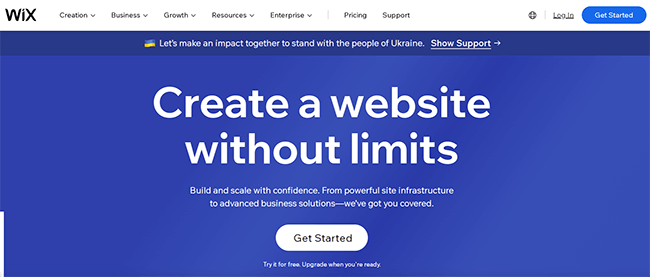
To sell through Wix, you’ll need to sign up for one of their business & ecommerce plans, which start from $27 per month.
Once you’ve done that, you can build your store in under an hour using Wix’s user-friendly, professionally-designed templates and drag-and-drop editor.
From there, you can list your products for sale, connect a payment processor, set up your checkout, and start selling. And unlike Etsy, you won’t be charged hefty transaction fees on your sales.
Depending on what plan you sign up for, Wix also comes with advanced features like the ability to set up abandoned cart notifications, promotional coupons, tax and shipping rules, social selling, and more.
Key features
- Accept payments
- Order management
- Unlimited products
- Abandoned cart recovery
- Custom domain
- Unlimited bandwidth
- Fast checkout
- 24/7 support
- Etsy integration
Pros
- Great selection of ecommerce templates
- Built-in marketing and sales tools
- Complete ownership and control over your store
- Easy to use
Cons
- Lacks advanced customization options
- Limited SEO features
#11 – eBay
eBay is one of the oldest and most well-established marketplace sites and it can be seen as a good alternative to Etsy in some ways. Unlike Amazon, there’s room in the eBay market for handcrafted goods, goods with negotiable pricing and more unique items.
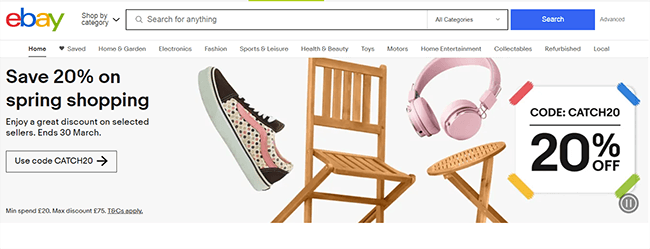
eBay is a vast marketplace so there’s lots of potential for discoverability and growth on the platform, and with flexible payment options for buyers, you can interact with customers, auction off your items and more.
Sales on eBay are subject to a couple of different fees. You’ll pay a listing fee, as well as a final value fee, which is 12.8% of the total amount of a sale + a fixed charge for each order. This can change depending on your region, and also the total value of your items.
Key features
- Well known marketplace
- Easy-to-use interface
- Sell items in any condition
- Flexible pricing models
Pros
- Ebay has a huge user base
- Flexible pricing and sales options
- Easy to list and sell items
Cons
- High commissions
- Large marketplace impacts discoverability
#12 – IndieMade
IndieMade is an ecommerce platform geared towards artists in particular and can be used as an alternative or an addition to your Etsy business. You can use IndieMade to build your own online store, start a blog, create a calendar or image gallery.
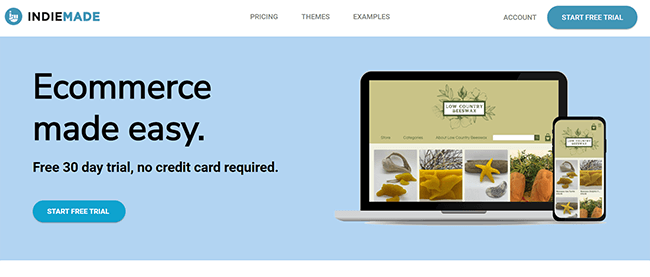
You can also use the inventory management to sync with Etsy so that you can manage sales on both platforms together and avoid overselling if you are using both platforms in tandem.
The main drawback of IndieMade is that its customization features are quite limited, so if you’re looking to completely rebrand your store then a different option such as Sellfy might provide more flexibility. Plans start from as little as $4.95 with no commissions on sales.
Key features
- Store Builder
- Inventory management
- Blog options
- Calendar and gallery tools
- Sales and marketing tools
Pros
- Works well alongside Etsy
- Created with artists and crafters in mind
- Very affordable
Cons
- Not the best store builder on the market
- Limited when it comes to store customization
Etsy Alternatives FAQs
What is the UK alternative to Etsy?
Folksy is one of the best options if you’re looking for a UK alternative to Etsy. Although you can sell in the UK on Etsy, it’s more of a global platform.
In contrast, Folksy is a UK-based company, so all its prices are listed in GBP and the fees are comparable to Etsy. It’s also much less saturated making it a good alternative for selling locally.
What is Etsy’s biggest competitor?
The biggest competitors to Etsy are Ebay or Amazon Handmade.
For Etsy sellers, eBay is a good alternative if you want to take advantage of an auction-based platform. Whereas, Amazon Handmade is a good choice if you want to leverage Amazon’s large user base to improve your business exposure.
Amazon is the leading consumer internet and online services company worldwide, so it’s a good option if you want a readymade audience for your products.
Is Etsy oversaturated?
Etsy is definitely more popular than it used to be, and it has a much more diverse range of sellers than it did a few years ago. However, I wouldn’t say that the platform is completely oversaturated.
There is a lot of competition, but the platform also has a lot of users, so it’s more than possible to make a living selling simple products like digital downloads and POD products on Etsy in 2023.
How much money can you make selling on Etsy?
It really depends on what you are selling and how popular your products are.
Although Etsy started as a marketplace for handmade craft sellers, products like digital downloads are quite popular at the moment, and with minimal production costs, it’s possible to make thousands of dollars every year in profit.
However, if you’re selling affordable handmade products, it may be hard to make a significant profit once labor, fees, and shipping costs are taken into account.
Is it still worth selling on Etsy?
Yes! There are lots of people making a lot of money from Etsy sales right now. The platform still has an extremely active customer base, so as long as you choose the right products, it’s definitely worth selling on the platform. However, it may be more lucrative to move away from Etsy and start selling from your own store, using a tool like Sellfy.
Choosing the best Etsy alternative for your business
Deciding which Etsy alternative is right for your business will depend on which direction you’re looking to take your business in.
If you’re looking to sell products online from your own online store, Sellfy is the easiest and cheapest way to do this
If you want a like-for-like marketplace that’s not as saturated as Etsy, then GoImagine or Bonanza may be right for you.
Or, if you’re looking for a full-scale ecommerce platform to grow your store, then Shopify is a solid option.
Also if you’d like to learn more about selling on Etsy, check out some of our other posts including:
- 15 Best Selling Items On Etsy – Original Research
- 35 Best Digital Products To Sell On Etsy (Includes Examples)
- DIY Ecommerce: 27 Things To Make And Sell
- 9 Best Etsy Print-On-Demand Companies Compared
- 13 Top Etsy Statistics You Need To Know
- The Best Ecommerce Platforms For Beginners (Comparison)
Disclosure: Our content is reader-supported. If you click on certain links we may make a commission.
